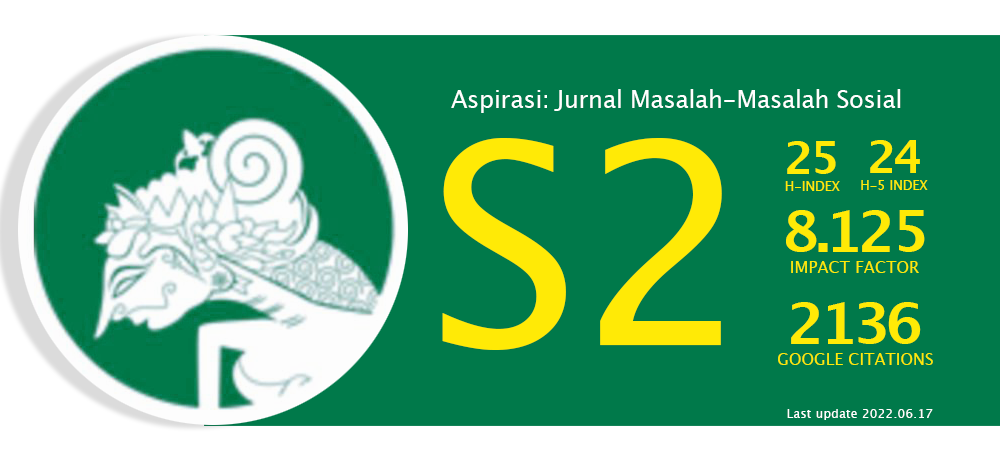MENUJU ASEAN BEBAS NARKOBA 2015: SITUASI PENYALAHGUNAAN NARKOBA DI INDONESIA
Abstract
Keywords
Full Text:
UntitledReferences
Buku
Chouvy, Pierre-Arnaud. 2011. Southeast Asia’s Thriving Drug Trade. Oct. 25, World Politics Review.
Devaney, Madonna et.al. 2006. Situational Analysis of Illicit Drug Issues and Responses in the Asia-Pacific Region. 2004-2005. Canberra: Australian National Council on Drugs.
Emmers, Ralf (a). 2003. The Threat of Transnational Crime in Southeast Asia: Drug-Trafficking, Human Smuggling and Trafficking, and Sea Piracy. Singapore: Institute of Defence and Strategic Studies (IDSS).
Emmers, Ralf (b). 2002.The Securitization of Transnational Crime in ASEAN. Singapore: Institute of Defence and Strategic Studies.
Jehani, Jehani dan Antoro, dkk. 2006. Mencegah Terjerumus Narkoba. Tangerang: Agromedia Pustaka.
Keohane, Robert O. dan Joseph S. Nye. 1971. Transnational Relations and World Politics. Boston: Harvard University Press.
Mariana, Anissa. 2008. Implikasi Perkembangan Ekonomi China dan Rencana Penerapan Pasar Tunggal ASEAN 2015 Terhadap Perekonomian Nasional dan Regional: Relevansi Strategi UKM Thailand, Malaysia, dan Indonesia dalam Menghadapi Liberalisasi Perdagangan. Tesis.Universitas Indonesia.
Martono, Lydia H. dan Satya Joewana. 2008. Peran Orang Tua dalam Mencegah dan Menanggulangi Penyalahgunaan Narkoba. Jakarta: Balai Pustaka.
Tanguay, Pascal. 2011. Policy Responses to Drug Issues in Malaysia. London: United Kingdom. International Drug Policy Consortium.
Dokumen
ASEAN Vision 2020, Kuala Lumpur, 1997. Badan Narkotika Nasional (BNN). “Indonesia Country Progress Report on Drug Control.” Disampaikan dalam Sidang ASEAN Inter-Parliamentary Assembly (AIPA) Fact-Finding Committee in Combating the Drug Menace (AIFOCOM) ke-11 di Laos pada Mei 2014. Drug Situation Report 2012. Central Narcotics Bureau, Singapore, 2013.
Narcotic Drugs Issues in Laos – Country Report, disampaikan dalam Sidang ASEAN Inter-Parliamentary Assembly (AIPA) Fact-Finding Committee in Combating the Drug Menace (AIFOCOM) ke-11 di Laos pada Mei 2014. Ninth United Nations Congress on the Prevention of Crime and the Treatment of Offenders, Cairo, Egypt, 29 April - 8 May 1995 (UN Doc. A.CONF.169/15/Add.1).
UNODC. 2008 World Drug Report.
UNODC. 2014 World Drug Report.
UNODC. Community-Based Treatment for Drug Users in Cambodia (KHM K51).
U.S. Department of Health and Human Sevices, “Substance Abuse and Mental Health Services Administration, Center for Behavioral Health Statistics and Quality.” Results from the 2012 National Survey on Drug Use and Health: Summary of National Findings.
U.S. Department of Health and Human Services. “National Institute on Drug Abuse. Drug Facts: Understanding Drug Abuse and Addiction.” November 2012.
Internet
“Arrests for Drug Abuse Up 50%.” 19 Februari 2014, dalam The Brunei Times. http://bt.com.bn/front page-news-national/2014/02/19/arrests-drugabuse-50, diakses tanggal 19 Maret 2014.
“DDB: 1.7 Pinoys Hooked on Drugs”. Jezz Diaz. The Philippine Star. http://www.philstar.com/headlines/2012/11/14/866389/ddb-17-millionpinoys-
hooked-drugs, diakses 19 Maret 2014.
“DOJ Reiterates Objection to Death Penalty.” Evelyn Macairan, the Philippine Star, http://www.philstar.com/headlines/2014/07/06/1342931/doj-reiteratesobjection-
death-penalty, diakses tanggal 6 Maret 2014.
“Drug Use on the Rise in Vietnam”. Thannien News. http://www.thanhniennews.com/society/drug-useon-the-rise-in-vietnam-1018.html, diakses tanggal 19 Juli 2014.
“Foundation for a Drug-Free World.” 2008. http:// www.drugfreeworld.org/drugfacts/references.html,diakses 19 Maret 2014.
”Ini jurus 5 M buat cegah pemakaian narkoba dalam keluarga.” Sholeh, Muhammad. Merdeka.com http://m.merdeka.com/piala-dunia/ini-jurus-5-m-buat-cegah-pemakaian-narkoba-dalamkeluarga.html, diakses tanggal 19 Maret 2014.
“Myanmar: Producing drugs for the region, fuelling addiction at home.” 2010. IRIN a service of the UN Office for the Coordination of Humanitarian Affairs.http://www.irinnews.org/printreport.aspx?ReportId=89622, diakses 19 Maret 2014.
“Ponsel, Modal Narapidana Kendalikan Bisnis Narkoba.” BBC Indonesia, dalam http://www.bbc.co.uk/indonesia/berita_indonesia/2013/07/130711_
lapsus_korupsi_narkoba.html, diakses tanggal 19 Maret 2014.
“Remaja dan Penyalahgunaan Narkoba,” diunduh dari humas BNN. http://dedihumas.bnn.go.id/read/section/artikel/2013/06/19/658/remaja-danpenyalahgunaan-narkoba, diakses tanggal 19 Maret 2014.
“Singapore’s Policy Keeps Drugs at Bay.”Michael Teo, The Guardian, 5 Juni 2010. http://www.theguardian.com/commentisfree/2010/jun/05/singapore-policydrugs-bay, diakses 19 Maret 2014.
“Thailand: Question marks over new approach to drugusers.” 2012. IRIN - a service of the UN Office for the Coordination of Humanitarian Affairs.http:// www.irinnews.org/report/96872/thailand-questionmarks-over-new-approach-to-drug-users, diakses 19 Maret 2014.
“UN Says Government Statistics on Drug Users Are Too Low”. Oleh Zsombor Peter dan Kaing Menghun. 20 Maret 2013. The Cambodia Daily, http://www.cambodiadaily.com/archives/un%E2% 80%88says-government-statistics-on-drug-usersare-too-low-15356/, diakses tanggal 19 Maret 2014.
“Waspadai Penggunaan Pelabuhan Sebagai Pintu Masuk Narkoba.” Kementerian Perhubungan Republik Indonesia. 2012. http://m.dephub.go.id/ read/berita/ direktorat-jenderal-perhubungan-laut/waspadaipenggunaan-pelabuhan-sebagai-pintu-masuknarkoba-10339, diakses 19 Maret 2014.
DOI: https://doi.org/10.46807/aspirasi.v5i1.445
Refbacks
- There are currently no refbacks.







